Newsflash
LMS e-News
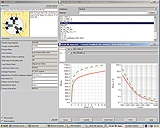
A critical factor in successful durability engineering is gaining a precise understanding of the loads that a product will undergo during its lifetime. The use of unreliable load scenarios inherently implies invalid fatigue-life predictions, regardless of the durability prediction solution that was used.
With LMS TecWare Load Data Processing you can efficenty analyze the vast amounts of accumulated data. Besides effective load data cleaning and validation, LMS TecWare focuses on monitoring and comparison of essential loading aspects from a durability perspective. Automatic creation of reports consisting of a customizable mix of time histories, rainflow matrices, frequency information, statistics and fatigue prediction aids in selecting representative loading scenarios for further Test or CAE based Durability engineering. It also delivers dedicated engineering insights which are needed to improve correlations between Test derived and CAE predicted load scenarios.
But this is not all, firmly decreasing the duration of validated load data signals is essential in drastically reducing the time required to execute Test-based or Virtual Durability tests. LMS TecWare Test Schedule Definition succeeds in this by efficiently determining sets of compressed load time histories that pesere the same damage potential as orginally present.
What will the attendee learn?
How to analyze dynamic loading conditions from a durability perspective Selection and definition of representative dynamic loading scenarios for fatigue evaluation Duration?
The session will last 1 hour and includes dedicated time for questions and answers.
 Click here to register for this free of charge web seminar.
Click here to register for this free of charge web seminar.
 If you want more information on how a web seminar works, please click here
If you want more information on how a web seminar works, please click here
 Click here to check out other upcoming webseminars.
Click here to check out other upcoming webseminars.
LMS Conference Europe 2007 - Stuttgart, Germany, April 17 and 18 - last call!
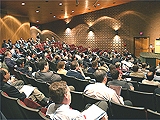 --%>
--%>LMS cordially invites you to attend the sixth edition of the LMS Conference Europe, which will be held on April 17 and 18 in Stuttgart, Germany.
Engineers from leading manufacturers in the automotive, aerospace, and other manufacturing industries will illustrate the advances they made in virtual prototype simulation, in combining test and CAE, in tackling performance issues earlier, and in increasing testing productivity.
Click here to view the detailed conference agenda online.
Keynote speakers of the 2007 conference edition:
 General Motors Powertrain Europe
General Motors Powertrain Europe
Challenges and strategies for applying CAE in powertrain development Giovanni Cipolla, Director Advanced Engineering and Hybrids
 IFP
IFP
Using AMESim libraries for powertrain development at IFP Arnaud Torres, Associate Director Powertrain Engineering Technology Business
Unit
 Heidelberger Druckmaschinen AG
Heidelberger Druckmaschinen AG
Tailoring machine dynamics in the design of sheetfed offset printing presses Dr. Stefan Schreiber, Leiter Mechanik, Messtechnik
 Mitsubishi Motors Corporation
Mitsubishi Motors Corporation
Applying new technologies to innovate the vehicle development proces Hirotaka Shiozaki, Manager (CAE) Digital Engineering Department
Plus over 40 industry speakers in 3 parallel sessions:
Airbus, Autoliv, BAE Systems, CA Engineering und Service, CIRA, CRF, DaimlerChrysler, Denso Thermal Systems SpA, Deutsches Zentrum für Luft- und Raumfahrt (DLR), ELASIS, FH Ingolstadt, Ford Lommel Proving Ground, Fraunhofer LBF, Fraunhofer-Institut für Produktiontechnologie IPT, GE Energy, General Motors Powertrain Europe, Heidelberger Druckmaschinen, IDIADA, IDS Ingegneria dei Sistemi S.p.A., IFP, IMAGINE, Indian Institute of Technology Bombay, IPG Automotive, Landi Renzo, Mitsubishi Motors Corporation, Novicos, Office National d’Études et de Recherches Aérospatiales (ONERA), Picanol, Politecnico Di Milano, PSA PEUGEOT CITROËN, Renault, Rieter Automotive Systems, S.A.B.C.A., Technische Universität Hamburg-Harburg, TEMSA Automotive, Uiersität Stuttgart, University of Ferrara, University of Michigan, University of Pisa, Vibracoustic, VOLKSWAGEN
Registration:
 The delegate registration fee for the 2-day conference is 590 Euro per person
The delegate registration fee for the 2-day conference is 590 Euro per person
 A one day conference ticket is available at 390 Euro
A one day conference ticket is available at 390 Euro
 University attendees pay 290 Euro
University attendees pay 290 Euro
 A special ‘company package’ of 1.500 Euro is available for 3 up to 5 people attendees from the same company
A special ‘company package’ of 1.500 Euro is available for 3 up to 5 people attendees from the same company
 Click here to view the complete agenda
Click here to view the complete agenda
 Click here for more practical details
Click here for more practical details
 Click here to register online
Click here to register online
The Latest LMS News Magazine - November 2006
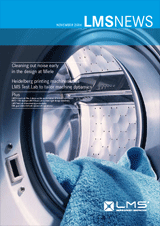 --%>
--%>In its News Magazine, LMS showcases best practices in virtual prototype simulation and physical prototype testing, customer and industry applications, the latest technology trends and new LMS products.
The LMS News Magazine is issued 3 times per year and distributed free of charge. If you wish to receive your own personal free copy of the LMS News magazine, please go to the My Profile section to register or to manage your profile and mailing preferences.
Click on the cover of our latest LMS News to view the PDF or check out the previous editions in the LMS News archive. If you want to request physical copies of older LMS News issues, send a email with your address details and the month and year of the desired issue to kirsten.cabergs@lms.be.
November 2006 Key Topics:
 Cleaning out noise early in the design at Miele
Cleaning out noise early in the design at Miele
 Heidelberg printing machines uses LMS Test.Lab to tailor machine dynamics
Heidelberg printing machines uses LMS Test.Lab to tailor machine dynamics
 LMS Virtual.Lab Rev 6 steps up the performance of realistic simulation
LMS Virtual.Lab Rev 6 steps up the performance of realistic simulation
 AVIC-1 FAI deploys LMS Virtual.Lab to meet tight design deadlines
AVIC-1 FAI deploys LMS Virtual.Lab to meet tight design deadlines
 LMS Test.Lab drives testing productivity
LMS Test.Lab drives testing productivity
 ESA guarantees fail-safe spacecraft operations
ESA guarantees fail-safe spacecraft operations
Join the free LMS webseminars on noise and vibration testing
Rotating Machinery: Tips and Tricks for Efficient Noise and Vibration Testing - June 29, 10AM Brussels time
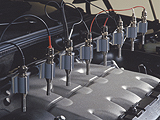 --%>
--%>This Web Seminar is Part II of a two part series. Part I covered virtual simulation.
Part II shows how to efficiently measure and analyze the noise and vibration performance of rotating machinery using state-of-the-art techniques and methods. Real-lilfe user scenarios from a wide range of rotating machinery (electric motor, a turbo motor, ignition engine..) are used to illustrate best practices available today.
Ride Comfort and ISO whole body vibration - July 4, 10AM Brussels time
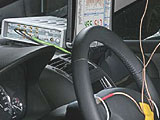 --%>
--%>Ride Comfort is the general sensation of noise, vibration and motion inside a driving vehicle, experienced by both the driver as well as the passengers. Ride comfort goes beyond the pure ISO2631 Whole body vibration certification testing as it affects the comfort, safety and health of the people subjected to it.
Measuring and quantifying ride comfort can help you in meeting the necessary standards and regulations, but moreover gives you the insights to troubleshoot, understand and improve the noise and vibration comfort of the vehicle.
Pressure based ISO sound power - July 6, 10AM Brussels time
Sound power is a measure of the total noise (or acoustic power) generated and radiated by a machine or tool. It is a characteristic property of the equipment itself and is not influenced by the environment it is operating in. As such, the sound power value can be used in order to check compliance with the ISO based standards and legislations for certification of product noise. Specifically for the broad range of outdoor equipment, a European directive for noise emission (2000/14/EC) forces the manufacturers to conduct the ISO based sound power measurements, to label their equipment (noise marking) or to comply with maximum values (noise limiting).
Press Release Date 25 Jul 2007
Acoustic simulation allows Omyang engineers to accurately predict the sound of speaker systems inside the vehicle
Leuven, Belgium – LMS, the engineering innovation company, today announced that Korea Omyang Corporation selected LMS Virtual.Lab Acoustics to optimize the acoustic performance of speaker systems which are built in passenger cars for in-vehicle entertainment. Acoustic simulation is used to support the design of speaker systems at the Korean manufacturer and to analyze the mounting strategy in the vehicle interior to obtain an optimal sound quality. The acoustics engineering team at Korea Omyang Corporation selected the Virtual.Lab solution for its powerful capabilities to accurately predict the generated sound of their speaker system designs, taking into account the vehicle interior.
Korea Omyang Corporation specializes in the development and manufacturing of speakers for cars, TV sets, phones, Hi-Fi and other audio/visual systems. Its primary customers include companies like Lucent, Toshiba, Sony, Schneider in the consumer electronics field, and automotive manufactures like Hyundai, Kia, GM Daewoo and GM Holden. In the automotive field, Korea Omyang Corporation faces the stringent challenge of developing a competitive speaker package which is adapted to the new vehicle model or interior configuration. The company selected LMS Virtual.Lab Acoustics to increase its development speed and to efficiently optimize the shape, packaging, positioning and mounting of the speakers for optimal sound.
In a first step, LMS Virtual.Lab Acoustics is used to optimize the sound of the individual speaker elements and to optimize the accuracy of the speaker simulation models before they are mounted in a vehicle interior configuration. In a second step, Omyang engineers investigate and optimize the vibration and sound levels of the individual speakers mounted in the vehicle interior. In doing so, they face very stringent requirements from the OEM in terms of allowed space and position, overall weight, cost and obviously the required sound quality. “The deployment of LMS Virtual.Lab Acoustics allows us to carefully balance all these requirements from the early development stage onwards. The LMS solution gives us an accurate prediction of the acoustic performance of a specific design option, and allows us to trace back the root cause of sound or vibration problems,” commented Kab Jae, Yoo, Senior engineer at Korea Omyang Corporation.
The company also valued LMS Virtual.Lab for its tight integration with CATIA V5 and its facilities to exchange models with automotive OEMs. “The smooth exchange with our internal or our customer’s design team saves a lot of modeling time and strongly facilitates the communication process,” commented Kab Jae, Yoo. ”The tight integration of all simulation process steps in LMS Virtual.Lab delivers an additional efficiency gain, and allow us to deliver the accurate insight which is required to make critical design decisions.”
For high resolution images, please visit www.lmsintl.com/pressimages
For more information on LMS Virtual.Lab, please visit www.lmsintl.com/virtuallab
